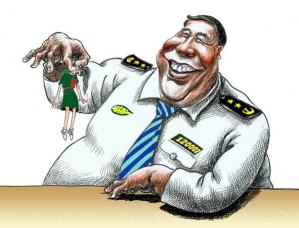Editor’s Note: The Word of the Week comes from China Digital Space’s Grass-Mud Horse Lexicon, a glossary of terms created by Chinese netizens and frequently encountered in online political discussions. These are the words of China’s online “resistance discourse,” used to mock and subvert the official language around censorship and political correctness.
If you are interested in participating in this project by submitting and/or translating terms, please contact the CDT editors at CDT [at] chinadigitaltimes [dot] net.
屁民 (pì mín): rabble (literally “fart people” or “bum people”)
The term comes from a 2008 incident involving Lin Jiaxiang, former Party Secretary of the Shenzhen Maritime Administration, who was caught on surveillance camera harassing an eleven-year-old girl. (He had asked her where the bathroom was, then cornered her after she showed him the way.) After the young girl escaped, the girl’s parents confronted Lin. Angrily pointing at the girl’s father, Lin shouted:
Do you people know who I am? I was sent here by the Ministry of Transportation. I’m on par with your mayor. You people are worth less than a fart to me! How dare you mess with me? Just see how I deal with you.
我是交通部派下的,级别和你们市长一样高。你们算个屁!敢跟我斗,看我怎么收拾你们。
“You people are worth less than a fart to me” was picked up by netizens and morphed into the term “fart people.”
While the term can be used as an insult, it has also been proudly adopted by netizens as a label for themselves (see this blog post in Chinese titled “I’m a Fart Person; Who Am I Afraid Of!”). When discussing the relationship between the political elite and the masses, netizens often use the phrase “fart people” to designate the masses, suggesting just how much officials esteem ordinary citizens. Netizens have remarked that “without the ability to vote, we matter less than a fart” (没有选票, 我们就是个P!).









